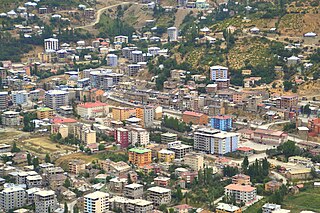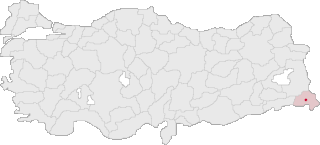![Kurdistan Free Life Party Political party in [[Iran]]](https://upload.wikimedia.org/wikipedia/commons/thumb/6/6b/Flag_of_Partiya_Jiyana_Azad_a_Kurdistan%C3%AA.svg/320px-Flag_of_Partiya_Jiyana_Azad_a_Kurdistan%C3%AA.svg.png)
The Kurdistan Free Life Party, or PJAK, is a militant Kurdish leftist anti-Iranian government group. It has waged an intermittent armed struggle since 2004 against the Iranian government, seeking self-determination for Kurds in Iran and Eastern Kurdistan.

Şemdinli is a town and district located in the Hakkari Province of southeastern Turkey. It was previously in the Ottoman Vilayet of Van and the district centre was called Nevşehir. The current mayor is Tahir Sakli from the Justice and Development Party (AKP) and the current district governor (kaymakam) is Yakup Güven.
Kurdish nationalist uprisings have occurred periodically in Turkey, beginning with the Turkish War of Independence and the consequent transition from the Ottoman Empire into the modern Turkish state and lasting until present with the ongoing Kurdish–Turkish conflict.

Şırnak Province is a province of Turkey in the Southeastern Anatolia Region. Şırnak Province was created in 1990, with areas that were formerly part of the Siirt and Mardin Provinces. It borders both Kurdistan Region of Iraq and Syria. The current Governor of the province is Ali Hamza Pehlivan. As of 2013, the province had an estimated population of 475,255 people.

The Kurdish–Turkish conflict is an armed conflict between the Republic of Turkey and various Kurdish insurgent groups who have either demanded separation from Turkey to create an independent Kurdistan, or attempted to secure autonomy and greater political and cultural rights for Kurds inside the Republic of Turkey.

The October 2007 clashes in Hakkari were a series of clashes between the Kurdistan Workers' Party and the Turkish Armed Forces.

The Iran–PJAK conflict is an armed conflict between the Islamic Republic of Iran and Kurdish rebels of the Kurdistan Free Life Party (PJAK), which began in 2004. The group has carried out numerous attacks in the Kurdistan Province of Iran and provinces of Western Iran. PJAK is closely affiliated with the militant Kurdistan Workers' Party (PKK), the primary opponent of the Republic of Turkey in the Kurdish–Turkish conflict. PJAK has been designated as a terrorist organization by Iran, Japan, Turkey, and the United States.
The word serhildan describes several Kurdish protests and uprisings since the 1990s that used the slogan "Êdî Bese" ("Enough") against Turkey. Local shops are often closed on the day of demonstrations as a form of protest.

Operation Murat, which was launched on 23 April 1998, by the Turkish Army against the Kurdistan Workers' Party (PKK) in the Turkey's South-Eastern Hakkâri Province. It is said to have been the largest Turkish military operation in the entire Kurdish–Turkish conflict or even the largest Turkish military operation since the foundation of the Republic of Turkey.
The 2011–2012 Kurdish protests in Turkey are ongoing protests in Turkey, led by the Peace and Democracy Party (BDP), against restrictions of Kurdish rights by of the country's Kurdish minority's rights. Although they are the latest in a long series of protest actions by Kurds in Turkey, they are strongly influenced by the concurrent popular protests throughout the Middle East and North Africa, and the Turkish publication Hürriyet Daily News has suggested that the popularly dubbed "Arab Spring" that has seen revolutions in Egypt and Tunisia may lead to a "Kurdish Summer" in the northern reaches of the Middle East. Protesters have taken to the streets both in İstanbul and in southeast Turkey, with some demonstrations also reported as far west in Anatolia as İzmir.
On August 17, 2011, the Turkish Armed Forces launched multiple raids against Kurdistan Workers' Party (PKK) camps based in Iraq, striking 132 targets. Turkish military bombed PKK targets in northern Iraq in six days of air raids, according to General Staff.
The insurgency by the Kurdish Democratic Party of Iran surged in 1989, lasting until 1996, as part of the Kurdish separatism struggle. The eruption of the conflict in July 1989 was caused by the assassination of KDPI leader Abdul Rahman Qassemlou by suspected Iranian government agents. The most violent episodes took place in 1990 and 1991, when Kurdish soldiers launched massive attacks on Iranian military bases in Kurdish areas of Iran. This brought heavy retaliation from the Iranian government, aiming to eradicate the KDPI leadership by assassinating Sadegh Sharafkandi and other KDPI leaders in 1992 in order to disable the Kurdish party's ability to function. The conflict faded with the effective targeted assassination policy of Iran and by 1996 KDPI was no longer able to function militarily and announced a unilateral ceasefire. The conflict claimed hundreds of lives, mostly Iranian government troops and Kurdish militants.
The June 2012 Hakkari clashes were a series of clashes between the Kurdistan Workers' Party (PKK) and the Turkish Army near Şemdinli in Hakkâri Province in southeastern Turkey and northern Iraq. The clashes began on June 19, with a coordinated PKK attack on a Turkish Army post in Yuksekova town near the Iraq-Turkey border. On July 20–21, the PKK made an attempt to capture territory in Şemdinli, resulting in a Turkish counter-offensive which, according to Turkish security forces, resulted in eight Turkish security forces and 130 Kurdish militants killed. The Kurdistan Communities Union (KCK) recorded over 400 incidents of shelling, air bombardment and other armed clashes during August 2012. The events were described as the "heaviest fighting in Turkey in years".
The Lice massacre took place from 20 to 23 October 1993 in the Kurdish town of Lice, Turkey in the Diyarbakır Province of Southeastern Anatolia Region. The Turkish Armed Forces killed at least 30 civilians.

The 2015 police raids in Turkey were a series of police raids conducted by the General Directorate of Security in 16 different Provinces of Turkey. The July 20th, 2015 Suruç bombing in Suruç killed 32 Kurds. Claimed by ISIS, it was perceived by Kurdish militants as a collaboration between ISIS and Turkey security services, leading to a series of revenge attacks on Turkish policemen and military positions in Adıyaman and Ceylanpınar. The Ceylanpınar incidents saw the assassination of 2 policemen by operatives of disputed affiliation, attributed to the Kurdistan Workers' Party (PKK), and became the Casus belli for Turkey operations in both Turkey and Iraq.
Operation Martyr Yalçın was a military operation conducted by the Turkish Air Force against Islamic State of Iraq and the Levant (ISIL) positions in Syria, and Kurdistan Workers' Party (PKK) positions in northern Iraq, on 24 and 25 July 2015.
In late July 2015, the third phase of the Kurdish–Turkish conflict between various Kurdish insurgent groups and the Turkish government erupted, following a failed two and a half year-long peace process aimed at resolving the long-running conflict.

The 2015–2016 Şırnak clashes were a series of armed clashes in the southeastern Şırnak province, between Turkish government forces and Kurdish armed groups, as part of the Turkish–Kurdish conflict.
2016–present clashes in West Iran refers to the ongoing military clashes between Kurdish insurgent party Democratic Party of Iranian Kurdistan (PDKI) and the Iranian Revolutionary Guards, which began in April 2016. Kurdistan Freedom Party (PAK) and Komalah expressed their support to the Kurdish cause of PDKI as well, with both clashing with Iranian security forces in 2016 and 2017 respectively. In parallel, a leftist Iranian Kurdish rebel group PJAK resumed military activities against Iran in 2016, following a long period of stalemate.
The joint Claw-Eagle and Claw-Tiger operations was a Turkish Armed Forces external operation in northern Iraq. The operation took place in the Qandil Mountains, the Sinjar District, and Makhmur, against Kurdistan Workers' Party (PKK) targets, as part of the ongoing Kurdish–Turkish and Kurdish–Iranian conflicts. Claw-Eagle, the air campaign, began on 15 June 2020. Claw-Tiger, the ground campaign, was launched on 17 June.


![Kurdistan Free Life Party Political party in [[Iran]]](https://upload.wikimedia.org/wikipedia/commons/thumb/6/6b/Flag_of_Partiya_Jiyana_Azad_a_Kurdistan%C3%AA.svg/320px-Flag_of_Partiya_Jiyana_Azad_a_Kurdistan%C3%AA.svg.png)







